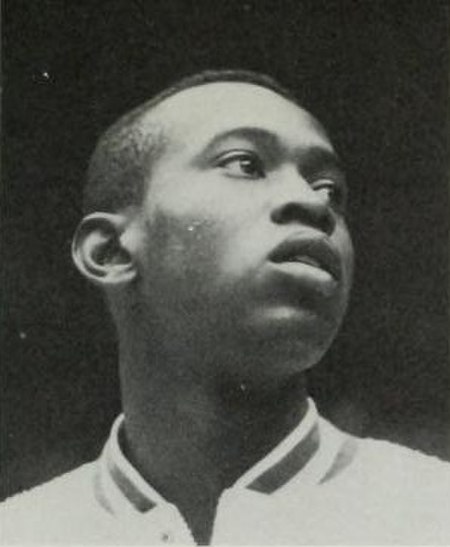Cherríe Moraga
| |||||||||||||||||||||

Gugus fungsi sulfonamida Hidroklortiazid merupakan sulfonamida dan tiazid. Furosemid merupakan sulfonamida, tetapi bukan tiazid. Sulfametoksazol merupakan sulfonamida yang bersifat antibakteri. Sulfonamida (atau sering juga disebut obat sulfa) merupakan golongan obat-obatan yang memiliki gugus fungsi sulfonamida. Golongan obat ini ada yang memiliki sifat antimikroba dan ada juga yang tidak. Obat sulfa yang tidak memiliki aktivitas antibakteri misalnya sultiam yang digunakan sebagai antikonvulsan…

American basketball player and coach Kenny WashingtonWashington in 1964Personal informationNationalityAmericanListed height6 ft 3 in (1.91 m)Career informationHigh schoolSmalls (Beaufort, South Carolina)CollegeUCLA (1963–1966)NBA draft1966: 8th round, 71st overall pickSelected by the San Francisco WarriorsPositionGuardCareer historyAs coach:1974–1975UCLA Career highlights and awards 2× NCAA champion (1964, 1965) Stats at Basketball-Reference.com Kenneth Washington is an…

Este artículo o sección necesita referencias que aparezcan en una publicación acreditada.Este aviso fue puesto el 23 de septiembre de 2013. Caipirinha Un vaso con Caipiriña.OrigenOrigen BrasilComposiciónTipo CóctelServida en Vaso corto Old Fashioned, aunque también se suele ver en vasos largosIngredientescachaza 5 cl.lima 1 unidadazúcar 20grhttp://iba-world.com/contemporary-classics/[editar datos en Wikidata] Caipiriña (en portugués: caipirinha) es una bebida brasileña…

فيكتور غولدشميت (بالألمانية: Victor Moritz Goldschmidt) معلومات شخصية الميلاد 27 يناير 1888[1][2][3] زيورخ الوفاة 20 مارس 1947 (59 سنة) أوسلو مواطنة النرويج عضو في الجمعية الملكية، والأكاديمية الألمانية للعلوم ليوبولدينا، وأكاديمية العلوم في الاتحاد ا…

Rolf Graf (1956) Rolf Graf (* 19. August 1932 in Eppenberg; † 18. Januar 2019 in Baden) war ein Schweizer Radrennfahrer. Sportliche Laufbahn Rolf Graf galt nach Ferdy Kübler, dessen Protégé er war, und Hugo Koblet als der stärkste Schweizer Rennfahrer der 1950er Jahre. Er war Profi von 1953 bis 1963. In dieser Zeit wurde er dreimal Schweizer Strassenmeister, gewann 1956 die Tour de Suisse und zahlreiche andere Rennen, darunter 1954 Gent–Wevelgem und 1956 den Trofeo Baracchi mit André Da…

2014 Turkish television season This article needs additional citations for verification. Please help improve this article by adding citations to reliable sources. Unsourced material may be challenged and removed.Find sources: Diriliş: Ertuğrul season 1 – news · newspapers · books · scholar · JSTOR (December 2020) (Learn how and when to remove this template message) Season of television series Diriliş: ErtuğrulSeason 1Official posterStarringEngin …

Lethal Weapon ist eine Weiterleitung auf diesen Artikel. Für die gleichnamige Fernsehserie siehe Lethal Weapon (Fernsehserie). Film Titel Lethal Weapon – Zwei stahlharte Profis Originaltitel Lethal Weapon Produktionsland USA Originalsprache Englisch Erscheinungsjahr 1987 Länge 112 Minuten Altersfreigabe FSK 18[1] /16 (gekürzte Version / Director’s Cut)/12 (geschnittene TV-Version) Stab Regie Richard Donner Drehbuch Shane Black Produktion Joel Silver,Richard Donner Musik Eric …

يفتقر محتوى هذه المقالة إلى الاستشهاد بمصادر. فضلاً، ساهم في تطوير هذه المقالة من خلال إضافة مصادر موثوق بها. أي معلومات غير موثقة يمكن التشكيك بها وإزالتها. (مارس 2019) هذه المقالة يتيمة إذ تصل إليها مقالات أخرى قليلة جدًا. فضلًا، ساعد بإضافة وصلة إليها في مقالات متعلقة بها. (ما…

متاؤس الأول معلومات شخصية مكان الميلاد مصر الوفاة 31 ديسمبر 1408 مصر الجنسية مصري الحياة العملية الكنيسة الكنيسة القبطية الأرثوذكسية معلومات شخصية الاسم عند الولادة متى الوفاة 1 مسرى 1125 ش / 28 أبريل 1378 م المثوى الأخير دير الأنبا رويس بالخندق الجنسية مصري مكان السكن كني…

Para orang tua yang mengenakan surjan lurik di sebelah Gunungan. Pakaian yang sudah jadi tersebut berbahan kain lurik. Lurik (aksara Jawa: ꦭꦸꦫꦶꦏ꧀) adalah kain dengan motif bergaris-garis kecil yang secara tradisional menjadi pakaian khas warga pria pedesaan di kalangan suku bangsa Jawa. Lurik yang berbahan dasar katun kasar memiliki harga yang relatif murah dan terjangkau untuk masyarakat kurang mampu. Lurik adalah bahan dasar untuk pembuatan surjan. Dalam perkembangan modern, lurik …

1998 studio album by Mike OldfieldTubular Bells IIIStudio album by Mike OldfieldReleased31 August 1998 (1998-08-31)RecordedDecember 1996–June 1998StudioOldfield's home studio in Es Cubells, Ibiza and LondonGenreNew-age, progressive rock, electronic, chill outLength46:36LabelWarner Music UKProducerMike OldfieldMike Oldfield chronology Voyager(1996) Tubular Bells III(1998) Guitars(1999) Tubular Bells series chronology Tubular Bells II(1992) Tubular Bells III(1998) The Mill…

Battle of the Mahdist War Battle of TamaiPart of the Mahdist War, 1881–1899An incident at the Battle of Tamai, eastern Sudan, 13th March, 1884 by Godfrey Douglas GilesDate13 March 1884LocationTamai, near Suakin, Eastern SudanResult British victoryBelligerents United Kingdom Mahdist SudanCommanders and leaders Sir Gerald Graham Osman DignaStrength 4,500 troops22 field guns6 machine-guns 10,000 troopsCasualties and losses 214 killed or wounded 4,000 killed or woundedvteMahdist WarMahdist uprisin…

2015 studio album by Nothing but ThievesNothing but ThievesStudio album by Nothing but ThievesReleased16 October 2015 (2015-10-16)GenreAlternative rockindie rockhard rockLength40:32LabelRCAProducerJulian EmeryNothing but Thieves chronology Ban All the Music(2015) Nothing but Thieves(2015) Broken Machine(2017) Singles from Nothing But Thieves Wake Up CallReleased: 2014 Tempt You (Evocatio)Released: 2014 Ban All The MusicReleased: 2015 ItchReleased: 2015 HangingReleased: 201…

College of the University of Texas at Austin The Cockrell School of EngineeringTypePublicEstablished1894Parent institutionUniversity of Texas at AustinEndowment$780 million (November 2, 2023)[1]DeanRoger BonnecazeAcademic staff289Undergraduates6,112 (Fall 2023)[2]Postgraduates2.320 (Fall 2023)[3]LocationAustin, Texas, USA The Cockrell School of Engineering is one of the eighteen colleges within the University of Texas at Austin. It has more than 8,000 students enrolled in…

2022 Pakistani TV series AngnaUrduانگنا GenreSoap operaDramaWritten bySameena AijazDirected bySaqib Zafar KhanTehseen KhanStarringAzfar RehmanAli AbbasRabab HashimAreeba HabibCountry of originPakistanOriginal languageUrduNo. of episodes66ProductionProducerAbdullah SejaRunning timeApprox 37-46 MinutesProduction companyIDream EntertainmentOriginal releaseNetworkARY DigitalRelease7 March (2022-03-07) –6 June 2022 (2022-06-06) Angna (Urdu: انگنا) is a Pakistani drama relea…

United States historic placeAnderson's MillU.S. National Register of Historic Places Show map of South CarolinaShow map of the United StatesNearest citySpartanburg, South CarolinaCoordinates34°52′59″N 82°0′42″W / 34.88306°N 82.01167°W / 34.88306; -82.01167Area5 acres (2.0 ha)Built1900NRHP reference No.78002529[1]Added to NRHPNovember 14, 1978 For the mill of the same name see Anderson's Mill, Smeaton Anderson's Mill is a historic water-p…

Indian Kannada film actor, singer (1929–2006) For other actors with the same name, see Raaj Kumar. Dr. RajkumarRajkumar stamp released in 2009BornSinganalluru Puttaswamaiah Muthuraj(1929-04-24)24 April 1929Dodda Gajanur,[1] British India[2]Died12 April 2006(2006-04-12) (aged 76)Bangalore, Karnataka, IndiaMonumentsKanteerava StudiosOccupationsActorSingerYears active1954–2000WorksFull listMovementGokak agitation[3]Spouse Parvathamma Rajkumar …

Radio station in Macomb, IllinoisWNLFMacomb, IllinoisFrequency95.9 MHzBrandingBackroad Country 95.9ProgrammingFormatCountryOwnershipOwnerFletcher Ford(Virden Broadcasting Corp.)Sister stationsWJEQ, WKAI, WLMD, WMQZHistoryFirst air date2001 (2001)[1]Call sign meaningNancy L. FosterTechnical informationFacility ID84197ClassAERP6,000 wattsHAAT100 meters (330 ft)Transmitter coordinates40°25′3.0″N 90°36′51.0″W / 40.417500°N 90.614167°W / 40.417500…

Georg Heinrich von Görtz by Lukas von Breda. Georg Heinrich von Görtz, Baron of Schlitz (1668 – 19 February 1719), diplomat in Swedish service, was born in Holstein and educated at Jena. Early life Coat of arms of the Schlitz genannt von Goertz family Born into an old and prominent German noble family from Fulda, he was the eldest of four sons of Philipp Friedrich von Schlitz gen. von Görtz (1641-1695) by his first wife, Juliane von Minnigerode (1652-1687). From his father's second marriage…

2009 Taiwanese television series Momo LovePromotional posterAlso known as桃花小妹Táohuā XiǎomèiGenreRomanceComedyHaremDirected byChu Yu-ning (瞿友寧)StarringJiro WangCyndi WangWong JinglunCalvin ChenKen ChuGodfrey GaoOpening theme喜歡你怎麼辦 (What To Do That I Love You) by Cyndi WangEnding theme很安靜 (Very Quiet) by FahrenheitCountry of originTaiwanOriginal languageMandarinNo. of episodes13ProductionProducerWang Xin-guiProduction locationTaiwanProduction companyComic Intern…

